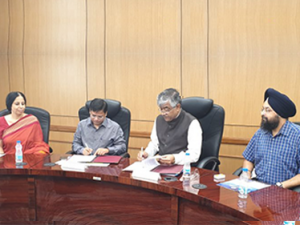IIT Delhi turns focus on industry-led research

IIT Delhi turns focus on industry-led research
NEW DELHI: The Indian Institute of Technology Delhi (IITD) is focusing on more industry-led research as part of a strategic shift aimed at improving its domestic as well as global rankings
“Research, especially industry-led research, would help institutes like ours improve their ranking. As a conscious effort, we are taking up more research basis the problems shared by industry,” IITD director V Ramgopal Rao told ET.
At most IITs, bulk of the research is funded by the government and government bodies. This year, IITD is targeting to ramp up funding for research work to Rs 550 Crore from Rs 400 Crore in the previous year, as ET had reported earlier.
Research and research funding are among the parameters on which institutes are ranked globally by organizations like QS (Quacquarelli Symonds). Research is also an important measure for the National Institutional Ranking Framework (NIRF), developed by the human resource development ministry. No Indian educational institution figures among the top 100 global universities recently ranked by QS. IIT Delhi ranks 182 in this list while in the NIRF list it ranks second among Indian engineering college .
“Currently we are focusing on projects across domains such as defense, auto, pharma and smart home devices,” said Rao. “In each of these cases, we have proactively engaged with industry stakeholders.”
The engagement with industry will only increase in the coming years, he said.
Another solution resulting from the academia-industry engagement is the partnership between IITD and TCS to conduct research on continuous manufacturing of drugs, a concept that has sparked interest among pharma companies owing to cost benefits. The lab at IITD is the only dedicated centre working on continuous manufacturing of drugs, according to Anurag Rathore, coordinator, DBT Centre of Excellence for Biopharmaceutical Technology, IIT Delhi.
“The annual cost of some of the cancer treatments can be more than Rs 25 Lakh and is a roadblock for schemes like Ayushman Bharat. Moving to continuous processing is one of the few options to significantly reduce prices of these medicines by 50-90%,” said Rathore.IIT Delhi turns focus on industry-led research“The annual cost of some of the cancer treatments can be more than Rs 25 Lakh and is a roadblock for schemes like Ayushman Bharat. Moving to continuous processing is one of the few options to significantly reduce prices of these medicines by 50-90%,” said Rathore.
Another such product developed at the campus is a smart home solution by Eden Smart Homes, a startup incubated at the campus. The startup has invented a small hardware module that is installed behind the switchboards, thus making all the existing appliances mobile-enabled. These devices can then be controlled using the Eden app.
“While large companies charge Rs 4-8 Lakh for automating a single 3BHK home, ESH provides a superior technology at a fraction of the cost,” said Pranjal Kacholia, founder, Eden Smart Homes.
Click to view Source link






